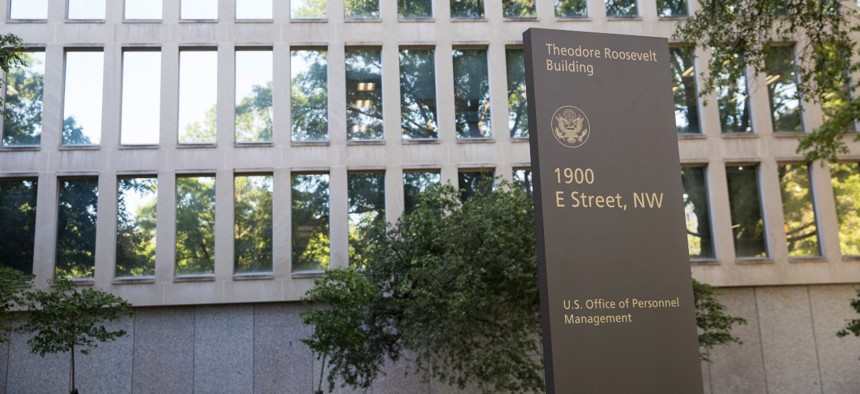
Sarah Silbiger for The Washington Post via Getty Images
The ‘Ban the Box’ Prohibition at Federal Agencies Will Soon Be Expanded
OPM has proposed a rule implementing The Fair Chance Act, which expands a preexisting ban on asking federal job applicants about criminal histories before the conditional job offer phase of the hiring process, and sets up a mechanism for applicants to report violations of the rule.
The Office of Personnel Management is set to publish proposed regulations Wednesday to implement a 2019 law expanding the federal government’s prohibition on asking job applicants about their criminal histories at the beginning of the hiring process.
President Trump signed the Fair Chance Act into law in 2019 as part of the 2020 National Defense Authorization Act. The law codifies the so-called “ban the box” policy of waiting until agencies extend a conditional offer of employment to a federal job applicant to ask them to disclose if they have a criminal history, which had already been implemented administratively in 2016; adds an enforcement component to the policy; and extends it to federal contractors.
In a proposed rule that will be published Wednesday in the Federal Register, OPM reiterates its prior regulations and clarifies what types of positions would be exempt from the prohibition on asking about an applicant’s criminal history, including if a position involves access to sensitive information, other national security duties, or federal law enforcement. Agencies seeking to exempt jobs from the policy must submit those requests to OPM, which will evaluate and grant them on a case-by-case basis.
“The Fair Chance Act applies to all appointments in the executive branch; i.e., to appointments in the competitive service, the excepted service, and the Senior Executive Service,” OPM wrote. “Agencies may request exceptions from OPM on a case-by-case basis. OPM will consider exceptions based on legitimate, job/position-related reasons, giving due consideration to requests for positions with specific job-related duties.”
Exceptions to OPM’s previous “ban the box” regulations will carry over under the new rules.
In the regulations, OPM said that it does not have data measuring whether the 2016 regulations changed how agencies conducted hiring, in part because OPM had already encouraged agencies to voluntarily delay when they ask about criminal histories, and chief human capital officers said that they generally did not ask for such disclosures at the start of the hiring process. The new regulations include a request for agencies to share data on the issue.
Job applicants who are improperly asked to disclose any criminal history prior to the conditional offer of employment may issue complaints with OPM, which can dole out penalties to federal employees for violations, including written warnings, suspensions without pay, as well as civil monetary penalties.
Critically, these penalties would not be subject to policies governing adverse personnel actions, although appeals to the Merit Systems Protection Board may be made in instances where the employee was suspended for more than 14 days or in cases where they received a suspension and a civil penalty.
“If the board finds that one or more of the charges brought by OPM against the employee is supported by a preponderance of the evidence, regardless of whether all specifications are sustained, it must affirm OPM’s action,” the rule states. “The board may neither review whether the adverse action is for such cause as will promote the efficiency of the service, nor mitigate the duration of a suspension or the amount of a civil penalty ordered under this part.”
OPM is soliciting comments from agencies and the public between now and June 26.







